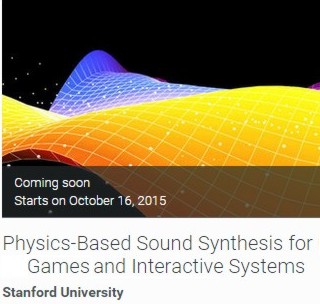| Stanford Online MOOC For Sound Synthesis |
| Written by Sue Gee |
| Thursday, 15 October 2015 |
|
A course on physics-based digital signal processing starts this week on the Kadenze platform. One of its prerequisites is familiarity with the ChucK programming language - and for that there's another Kadenze course already in progress. Physics-Based Sound Synthesis For Games And Interactive Systems starts on October 16, 2016. Comprising nine sessions, it runs through until February 1, 2016. In this video Perry Cook, consulting professor at Stanford Center for Computer Research in Music and Acoustics, who with CCRMA's Julius Smith is the course instructor, explains what participants with learn:
More information is given in the course description: This course introduces the basics of Digital Signal Processing and computational acoustics, motivated by the vibrational physics of real-world objects and systems. We will build from a simple mass-spring and pendulum to demonstrate oscillation, how to simulate those systems in the computer, and also prove that simple oscillation behaves as a sine wave. From that we move to plucked strings and struck bars, showing both solutions as combined traveling waves and combined sine wave harmonics. We continue to build and simulate more complex systems containing many vibrating objects and resonators (mandolin, drum, plate), and also learn how to simulate echos and room reverberation. Through this process, we will learn about digital signals, filters, oscillators, harmonics, spectral analysis, linear and non-linear systems, particle models, and all the necessary building blocks to synthesize essentially any sound. The free open-source software provided make it possible for anyone to use physical models in their art-making, game or movie sound, or any other application.: The software referred to is ChucK, an audio-centric programming language that provides precise control over time, audio computation, and user interface elements like track pads and joysticks. ChucK uses the vocabulary of sound making it accessible to musicians with little or no exposure to computer programming. The Kadenze ChucK Programming course, Introduction to Programming for Musicians and Digital Artists, has been in session since June 16 but you can still enroll and it runs until January 1, 2016. From the California Institute of the Arts it is being taught by CalArts's Director of Music Technology Ajay Kapur with guest lecturers Spencer Salazar, Perry Cook.and Ge Wang. Together they are the authors of the course textbook, Programming for Musicians and Digital Artists (Manning). Would-be participants in Kadenze courses can take them for free but this only gives access to the video lectures plus information about additional resources and to the discussion forums If you want to submit assignments,.receive grades and feedback and course completion certificates and build a portfolio of your work you can subscribe to Premium Membership, at a cost of $7 per month. This lets you enroll on unlimited courses and entitles you to discounts on the course textbooks. Some Kadenze courses give eligible students college credit and premium membership lets you enroll for credit for a fee of $300 per course. On the whole Kadenze courses are more arts and music than programming - but in the case of these two course there is a rich overlap.
More InformationPhysics-Based Sound Synthesis For Games And Interactive Introduction to Programming for Musicians and Digital Artists Related ArticlesFree Online Computer Science Courses Keeping Track of Computer Science Courses OSS University - A Free Computer Science
To be informed about new articles on I Programmer, sign up for our weekly newsletter, subscribe to the RSS feed and follow us on, Twitter, Facebook, Google+ or Linkedin.
Comments
or email your comment to: comments@i-programmer.info |
| Last Updated ( Thursday, 15 October 2015 ) |



